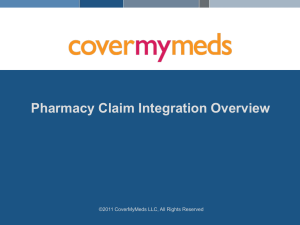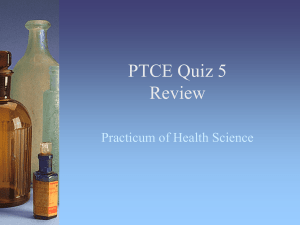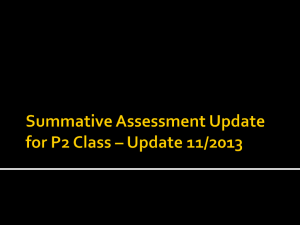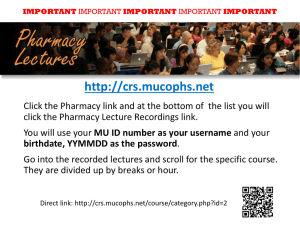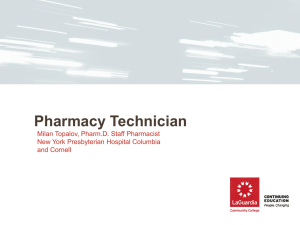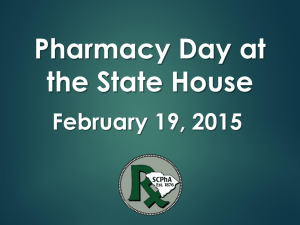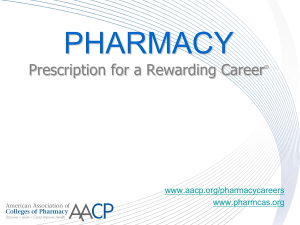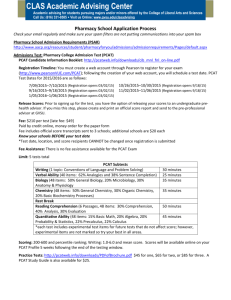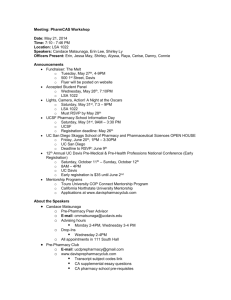Pharmacy School - University of Nevada, Reno
advertisement
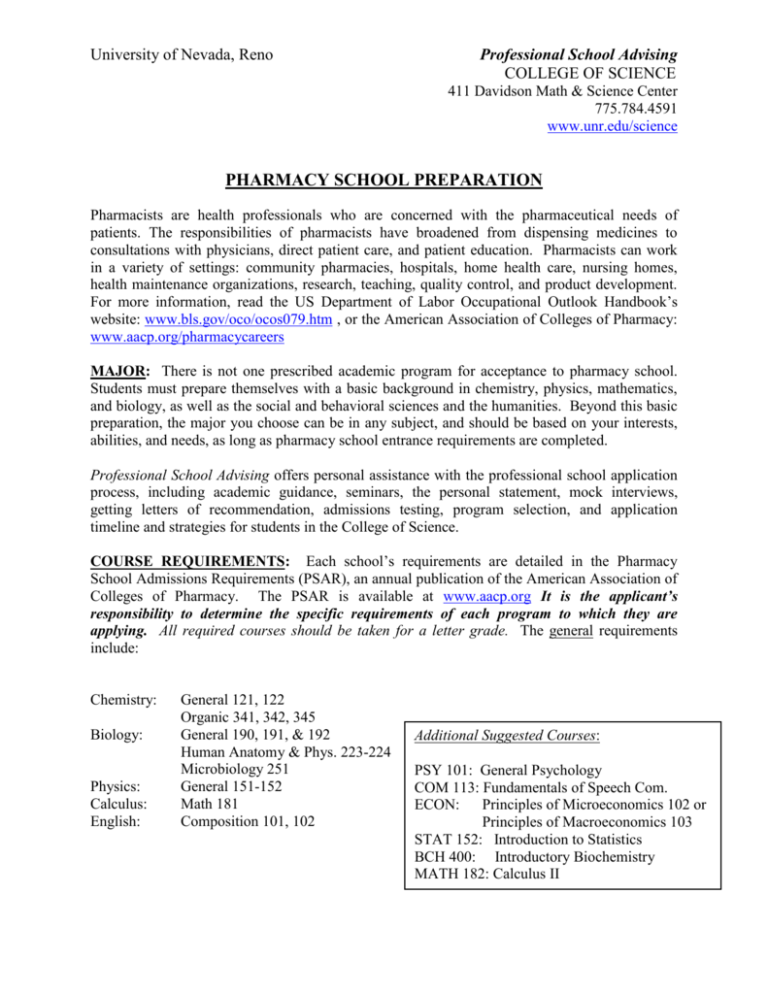
University of Nevada, Reno Professional School Advising COLLEGE OF SCIENCE 411 Davidson Math & Science Center 775.784.4591 www.unr.edu/science PHARMACY SCHOOL PREPARATION Pharmacists are health professionals who are concerned with the pharmaceutical needs of patients. The responsibilities of pharmacists have broadened from dispensing medicines to consultations with physicians, direct patient care, and patient education. Pharmacists can work in a variety of settings: community pharmacies, hospitals, home health care, nursing homes, health maintenance organizations, research, teaching, quality control, and product development. For more information, read the US Department of Labor Occupational Outlook Handbook’s website: www.bls.gov/oco/ocos079.htm , or the American Association of Colleges of Pharmacy: www.aacp.org/pharmacycareers MAJOR: There is not one prescribed academic program for acceptance to pharmacy school. Students must prepare themselves with a basic background in chemistry, physics, mathematics, and biology, as well as the social and behavioral sciences and the humanities. Beyond this basic preparation, the major you choose can be in any subject, and should be based on your interests, abilities, and needs, as long as pharmacy school entrance requirements are completed. Professional School Advising offers personal assistance with the professional school application process, including academic guidance, seminars, the personal statement, mock interviews, getting letters of recommendation, admissions testing, program selection, and application timeline and strategies for students in the College of Science. COURSE REQUIREMENTS: Each school’s requirements are detailed in the Pharmacy School Admissions Requirements (PSAR), an annual publication of the American Association of Colleges of Pharmacy. The PSAR is available at www.aacp.org It is the applicant’s responsibility to determine the specific requirements of each program to which they are applying. All required courses should be taken for a letter grade. The general requirements include: Chemistry: Biology: Physics: Calculus: English: General 121, 122 Organic 341, 342, 345 General 190, 191, & 192 Human Anatomy & Phys. 223-224 Microbiology 251 General 151-152 Math 181 Composition 101, 102 Additional Suggested Courses: PSY 101: General Psychology COM 113: Fundamentals of Speech Com. ECON: Principles of Microeconomics 102 or Principles of Macroeconomics 103 STAT 152: Introduction to Statistics BCH 400: Introductory Biochemistry MATH 182: Calculus II PHARMACY EDUCATION: The Doctor of Pharmacy (Pharm. D.) degree program requires at least 2 years of specific undergraduate course work followed by 3-4 years of professional study. Some programs accept applicants who have completed a minimum of 3 years of undergraduate study; however most programs prefer or require completion of an undergraduate degree prior to matriculation. STANDARDIZED TESTS: Approximately 75% of pharmacy schools require the Pharmacy College Admissions Test (PCAT). The test is now computer based and is offered 9 times a year Check with the individual colleges for their particular requirement regarding the test. The PCAT consists of six content areas: Verbal Ability, Quantitative Ability, Biology, Chemistry, Reading Comprehension, and a written essay. It is recommended that you take the PCAT during the winter or spring of the year you are applying. Information on the PCAT is available at www.pearsonassessments.com/haiweb/Cultures/enUS/site/Community/PostSecondary/Products/pcat/pcathome.htm EXTRACURRICULAR ACTIVITIES: Clinical experience is required for admission to most pharmacy schools. It does not matter if you are paid or a volunteer; admission committees want to know that an applicant has knowledge of the profession. It is also important for a competitive applicant to have participated in extracurricular activities, such as community and campus service, organized sports, research, pursue personal interests – all can be important in the admission process. APPLICATION PROCESS: The application process for pharmacy schools starts approximately 18 months prior to your matriculation date, and applications should be submitted 12-15 months before entering pharmacy school. Applicants need to prepare early by identifying schools to which they may apply, and the requirements, guidelines and deadlines for each program. Most pharmacy schools belong to the Pharmacy College Application Service (PharmCAS); more information is available at www.pharmcas.org/ Secondary/Supplemental Applications: After receiving your initial application (the PharmCAS application), a pharmacy school will send you their own application, known as a secondary or supplemental application. Interviews are the final state of the application process. If a school offers you an interview it means they are seriously considering you. All schools interview potential matriculants. LETTERS OF RECOMMENDATION: Most pharmacy schools require that the applicant send 2 or 3 letters of recommendation. It is advisable that one letter be from a pharmacist, preferably one with whom you have worked; plus letters from science professors and/or former employer may be required. PharmCAS provides a Letter of Recommendation Service; for more information go to www.pharmcas.org/applicants/eval.htm You may also consider storing your letters with a document collection and delivery service such as Interfolio; your letters can be kept on file for up to 5 years and delivered to the programs you are applying to at your convenience. For more information go to www.Interfolio.com Selection for admission is based on many factors including undergraduate GPA, test scores, letters of recommendation, extracurricular activities, an interview, personal statement, research experience, and awareness of and experience in health related fields. 2/12


